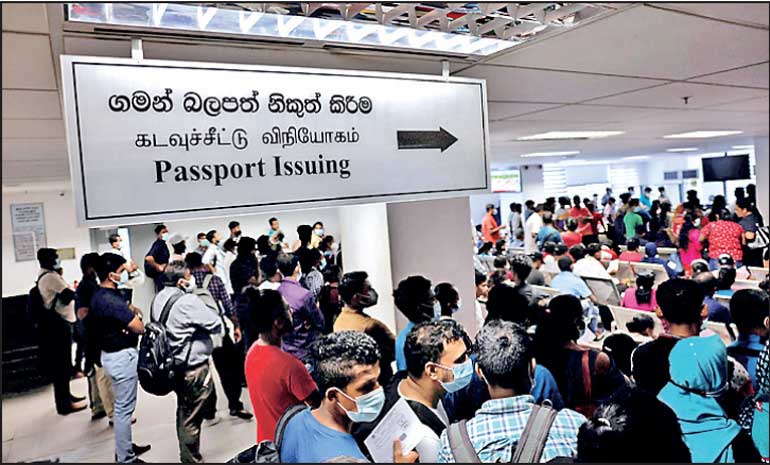Monday Dec 15, 2025
Monday Dec 15, 2025
Friday, 28 June 2024 00:18 - - {{hitsCtrl.values.hits}}

Passport office chaos during the height of the crisis
 Since gaining Independence in 1948, Sri Lanka has faced numerous challenges that have hindered its progress. Insurgencies in the 1970s and 1980s, a prolonged civil war, and the COVID-19 pandemic have significantly impacted the nation’s development, particularly in education. As a result, several generations have missed opportunities to realise their full potential, and our nation has suffered from not being able to fully utilise its talent and resources to achieve economic development because Sri Lanka has lost millions of trained talent to developed countries.
Since gaining Independence in 1948, Sri Lanka has faced numerous challenges that have hindered its progress. Insurgencies in the 1970s and 1980s, a prolonged civil war, and the COVID-19 pandemic have significantly impacted the nation’s development, particularly in education. As a result, several generations have missed opportunities to realise their full potential, and our nation has suffered from not being able to fully utilise its talent and resources to achieve economic development because Sri Lanka has lost millions of trained talent to developed countries.
Sri Lanka experienced a significant loss of young talent in 2022. According to the most recent data from SLBFE, approximately 311,056 Sri Lankans left the country for foreign employment in 2022, resulting in a monthly departure rate of over 29,000 people. A detailed examination of the data for the same year shows that the number of people leaving the country for professional-level jobs increased by 4.6%, but the number of low-skilled employees significantly increased by 33.92%. Forecasts based on this data suggest a doubling of these statistics in 2023. This brain drain was largely driven by a severe economic crisis, which resulted in widespread hardships and prompted many young professionals to seek better opportunities abroad. The poor governance system in the country pushed young people to seek more reliable environments. This loss of young talent poses significant long-term challenges for Sri Lanka, including a potential slowdown in innovation, reduced economic growth, and a weakened talent pool for future development.
Strategies for retention
To address this, Sri Lanka needs to stabilise its economy, improve governance, and create conditions that make staying and contributing to the local economy attractive for its young professionals. Retaining young educated workers is a critical challenge for Sri Lanka, requiring a multifaceted approach. Some countries have used strategies that have worked to reverse the brain drain:
1. Economic opportunities
Investing in sectors with high growth potential is crucial for creating new job opportunities. Focus on industries such as technology, renewable energy, tourism, and manufacturing can absorb a significant number of young professionals, providing them with stable and rewarding careers. Additionally, providing financial support, training, and resources to encourage young entrepreneurs is vital. Establishing incubators and accelerators to nurture startups, offering grants and low-interest loans, and creating mentorship programs that connect young entrepreneurs with experienced business leaders can stimulate entrepreneurial growth.
2. Education and skills development
Improving the quality of education to match the demands of the modern workforce is essential. This includes updating curriculums to include digital literacy, critical thinking, and problem-solving skills. Collaboration with industry leaders can ensure that educational programs are aligned with market needs. Offering opportunities for ongoing education and professional development through online learning platforms, workshops, and certification programs will help professionals upgrade their skills and stay competitive in the job market.
3. Infrastructure development
Ensuring widespread access to high-speed internet and modern technology is crucial for both education and business. Investing in digital infrastructure will enable remote work, online learning, and the growth of tech startups. Developing efficient public transportation systems to improve accessibility to job markets is also essential. A well-connected transportation network can reduce commute times, making it easier for professionals to access employment opportunities.
4. Governance and political stability
Implementing measures to reduce corruption and improve governance is critical. Strengthening anti-corruption agencies, enhancing transparency in government processes, and promoting accountability among public officials are necessary steps. Fostering a stable political environment to ensure long-term planning and investment is also vital. Political stability is essential for economic confidence and attracting both domestic and foreign investments.
5. Work-life balance and quality of life
Improving access to affordable healthcare and housing is fundamental. Investing in healthcare infrastructure and providing subsidies or financial assistance for housing will ensure that young professionals have a secure and healthy living environment. Developing recreational and cultural facilities to enhance the quality of life is also important. Parks, sports complexes, theatres, and cultural centres can contribute to a balanced and fulfilling lifestyle.
6. Incentives and benefits
Offering competitive salaries and benefits is crucial for attracting and retaining talent. Regularly benchmarking salaries against regional and international standards will ensure competitiveness. Providing tax incentives for companies that employ young professionals can reduce the financial burden on businesses and encourage them to hire more local talent.
7. Engagement and inclusion
Involving young people in decision-making processes and policy development is essential. Creating youth councils and advisory boards will ensure that the perspectives and ideas of young professionals are considered in governance and development plans. Ensuring policies are inclusive and address the diverse needs of the youth is also important. Tailoring programs to support different demographic groups, including women, minorities, and rural youth, will create equal opportunities for all.
8. Career advancement
Developing mentorship and leadership programs to guide career progression is vital. Pairing young professionals with experienced mentors who can provide guidance, advice, and support in their career journeys is beneficial. Implementing systems to recognise and reward outstanding contributions through awards, public recognition programs, and performance-based bonuses will motivate and retain high performers.
Conclusion
By addressing these areas, Sri Lanka can create an environment that not only retains young educated workers but also attracts international talent. Building a strong pipeline of skilled talent will foster sustainable economic growth and development, positioning Sri Lanka as a competitive and vibrant economy on the global stage. The findings from the Human Capital summit in July will hopefully provide guidance to the Sri Lankan Government and policymakers for more effective decision-making. The skilled migration has continued to be a topic of interest for policymakers and employers all over the world because of its significant social and economic ramifications and economic fortunes.
References:
https://www.ilo.org/media/556041/download
https://www.researchgate.net/publication/378873650_Unveiling_Sri_Lanka’s_brain_drain_and_labour_market_pressure_A_study_of_macroeconomic_factors_on_migration
https://link.springer.com/chapter/10.1007/978-3-031-33476-4_2
(The writer teaches accounting and finance at a UK university.)